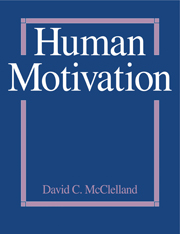Book contents
- Frontmatter
- Preface
- Foreword
- Contents
- Part 1 Background
- Part 2 The Nature of Human Motives
- Part 3 Important Motive Systems
- Part 4 Contextual Effects on Human Motives
- 11 Motivational Trends in Society
- 12 Cognitive Effects on Motivation
- 13 How Motives Interact with Values and Skills to Determine What People Do
- 14 Motivation Training
- 15 Milestones in the Progress Toward a Scientific Understanding of Human Motivation
- Bibliography
- Acknowledgments
- Index
12 - Cognitive Effects on Motivation
Published online by Cambridge University Press: 05 July 2014
- Frontmatter
- Preface
- Foreword
- Contents
- Part 1 Background
- Part 2 The Nature of Human Motives
- Part 3 Important Motive Systems
- Part 4 Contextual Effects on Human Motives
- 11 Motivational Trends in Society
- 12 Cognitive Effects on Motivation
- 13 How Motives Interact with Values and Skills to Determine What People Do
- 14 Motivation Training
- 15 Milestones in the Progress Toward a Scientific Understanding of Human Motivation
- Bibliography
- Acknowledgments
- Index
Summary
• COGNITIVE INFLUENCES ON MOTIVE AROUSAL
Several theorists, notably Weiner (1980a) and Heckhausen (1980), have stressed the great importance of cognitive factors in the motivation-action sequence. As Weiner (1979) puts it, “Comprehension Stands with hedonism as among the primary sources of motivation.” He feels that in motivation theory too much emphasis has been placed on affective arousal and not enough on the understanding the person has of what is happening during a motivation-action sequence, which determines whether affective arousal occurs or not.
A great many empirical studies have been carried out to clarify the relationship between cognition and motivation, but before reviewing them it is worth reexamining Figure 6.1, which identifies the key factors in a motivation-action sequence. Arousal demands (cues) typically contact an incentive, which, if it relates to an existing motive disposition, leads to an aroused motive or motivation to act. When, how, and whether this motivation gets converted into action is influenced by skills, cognitions (values), and opportunities, which determine whether a particular kind of behavior occurs or not.
As noted previously, Weiner, Atkinson, and others use the term motivation to describe the final excitatory potential for an act (the impulse to a given act) after it has been influenced by expectations and values, whereas we use the term motivation in the more restricted sense to refer to an aroused motive before it is influenced by expectations and values that shape preferences for particular acts.
- Type
- Chapter
- Information
- Human Motivation , pp. 473 - 513Publisher: Cambridge University PressPrint publication year: 1988



